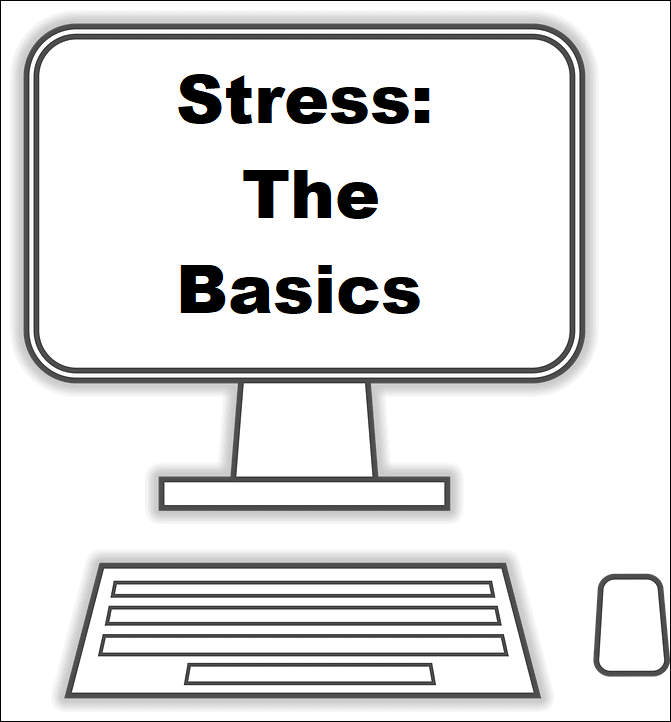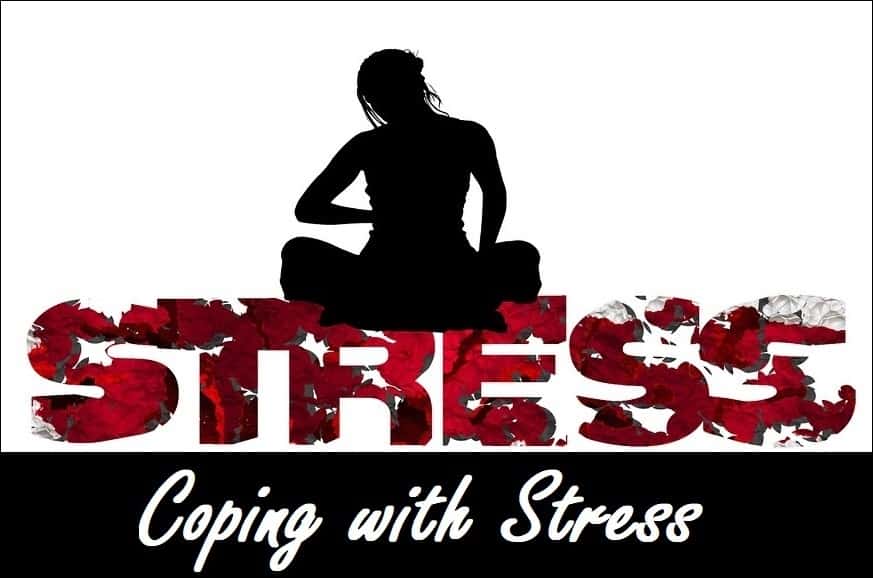This post may contain affiliate links. As an Amazon Associate I earn from qualifying purchases. If you click on the link and make a purchase I receive small commission (at no extra cost to you!), which helps fund the Mom Revamped Site.

How do you handle stressful situations?
Maybe you’re the avoid them type. Not that avoiding the situation will stop it from happening, but you can still avoid dealing with it. For some people, that’s there go to “coping with stress” strategy.
Or maybe you’re like me. The obsess over the situation until it completely takes over your life type. For us, our go-to “coping with stress” strategy is spending every waking moment thinking about it, trying to come up with a plan to deal with it.
Neither of these strategies is helpful, or healthy.
For me, the stressful situation that consumed my life was a legal battle. The stress from dealing with that battle pushed me into full-blown anxiety, panic attacks and all, that resulted in me taking a leave of absence from my job and needing medication for a year.
But one year ago today, that stressful battle finally came to an end. Now that the situation is behind me, I can look back and see how much I learned that year. As bad as it was, it was what pushed me to make some big changes to live a healthier and happier life, with more focus on my mental wellness.
But it also taught me that I needed to come up with some better ways to cope with stress and make self-care a priority. Because I don’t want to ever live through the anxiety that situation caused me again.
Stress 101

Before we go over the most helpful stress management tips I have found, let’s take a quick look at some basics about stress.
What Is Stress
Stress is our body’s reaction to the pressures, demands, challenges, and dangers of life. Stress is what triggers our fight or flight response, activating the hormones in our body that help us respond to a perceived danger.
So basically, stress is the not-so-pleasant way that our body prepares us to deal with that stressful issue we find ourselves facing.
Causes of Stress
While specific events often trigger stress, it’s not actually that situation that causes stress. Rather, it’s our perception of the situation. The support we have in our lives, our past experiences, and our own “coping with stress strategies” all influence how much stress a situation will cause us.
Symptoms and Effects of Stress
Just as the causes of stress, and reactions to stressful situations, are different for everyone, so are the symptoms we experience.
- Emotional symptoms include things like being easily agitated or moody, feelings of being overwhelmed, lack of ambition and motivation, and sadness or depression.
- Physical symptoms can include lack of energy and fatigue, dizziness, tense muscles, heartburn, headaches, chest pains, gastrointestinal issues, insomnia and can even cause our immune system to be weakened.
- Cognitive symptoms include difficulties concentrating, impaired memory, focusing on the negatives in our lives, and causing us to make bad choices (like developing an unhealthy reliance on drugs and/or alcohol to cope).
What Is Anxiety
Many people experience anxiety as a reaction to stress.
Now, when I say anxiety, I’m not talking about an actual anxiety disorder. However, having experienced living with an anxiety disorder when I was younger and living through anxiety caused by chronic stress (what I refer to as situational anxiety), I can tell you it doesn’t feel much different. Just like with an anxiety disorder, situational anxiety can come with panic attacks and many people need to take medication to cope with it.
In addition to many of the same symptoms of stress, anxiety can cause you to feel uncontrollable feelings of worry, fear, or panic. For some people, they may feel disconnected. It can feel like butterflies in your stomach or even constant nausea. Some people may feel their heart racing or feel weak or tired. Like stress symptoms, the symptoms of anxiety are different for everyone.
Types of Stressors
Since stress is caused by how we perceive a situation, anything could cause someone stress. However, in his book “Stress and the Manager”, Dr. Karl Albrecht defined the 4 most common types of stress.
- Time stress, which is the stress caused by worrying about how much you have to do and how little time you have to do it. (really, who hasn’t experienced that at some point?)
- Anticipatory stress, which is the stress caused by worrying about a specific future event or just the future in general.
- Situational Stress, which is the stress caused by a particular situation which you feel you have no control over (this one I’m quite familiar with)
- Encounter stress which is stress caused by worry about interacting with others.
What Are Examples of Life Stressors
Even though our own perception influences the severity of the stress a situation causes us, there are generally some situations that are considered to be bigger life stressors than others. The Holmes and Rahe Stress inventory is a scale that ranks life events by most to least stressful and lists 43 examples of common life stressors.
What Are The 10 Most Stressful Events in Life (According to The Holmes And Rahe Stress Inventory)?
- Death of a spouse
- Divorce
- Marital separation
- Detention in jail or other institution
- Death of a close family member
- Major illness or injury
- Marriage
- Being Fired
- Marital reconciliation
- Retirement
Stressful Situations at Work
Of course, our personal lives aren’t the only area we experience stress in. For many of us the biggest source of our stress, and where we face the most stressful situations, is our workplace. With people having to work longer hours, deadlines becoming shorter, and many of us being expected to do more work with less staff, it’s easy to see why there are so many causes of stress in the workplace.
Tips for Coping with Stress
Whether you’re dealing with a stressful situation in the workplace or in life, or just dealing with the build up of a bunch of little life stressors, having a go-to list of “coping with stress” strategies can help you to make sure that stress, or a specific stressful issue, doesn’t take over your life.
These are all the things I did when I was at my worst and the ones that I am implementing in my life now so that I’m ready next time a stressful issue is thrown my way.
Taking Care of Yourself

Distraction
If you’re the type of person who tends to avoid dealing with the situation that is causing you stress in the first place, then this strategy isn’t for you. Yes, some distraction is good, but you do eventually have to deal with the situation too.
However, if you’re like me, and you tend to dwell on the stressful situation until it has consumed your life, distraction is a technique you need to be using.
Seriously, you need to give yourself a break.
- Watch a movie or TV show
- Read a book (or ebook) or listen to an audio book
- Go out with a friend
- Engage in a hobby
- Look through old photo’s
- Garden
- Exercise
- Draw
- Paint.
- Color and adult coloring book (which has been shown to be a great stress reliever)
Just find something to do to get out of your own head.
My two go-to distractions were playing video games with the Husband and planning out a dream vacation for the two of us. Shooting people in video games not only distracted me from the situation, but it allowed me to release a bit of anger too. And the dream vacation, well, planning for the future just made me feel happy for a bit.
Me Time
When stress and anxiety start to take over our lives, and we find ourselves overwhelmed with everything we have to do, the first thing we tend to cut from our schedules is the time for ourselves.
I mean, really, who has time to take a bath or go for a walk when there’s a situation that could ruin our life to deal with, right?
Wrong.
When we are facing a stressful issue, making time for self-care is more important than ever. It’s not selfish to put yourself, and some self-care time, first. Taking care of your own well-being will help give you the strength you need to deal with whatever is causing the stress in your life.
So, go for a walk, take a bath, do your nails, or spend some time on a hobby. Book yourself a day at the spa. Do whatever it is you like to do to feel happy.
Just make “me time” a priority.
Social Time
Having people we can lean on for support, and help distract us from our problems for a bit, is an important part of stress management. Yes, for some of us it can be hard to reach out, especially if you’ve isolated yourself for a long time, but you need to make yourself do it.
Call up a friend and don’t hang up that phone until you have made plans to get together. Or arrange a family get-together, maybe a game night or just a casual potluck BBQ. Plan a date night with your spouse or a romantic weekend getaway.
If you really don’t have many people in your life to reach out to, then it’s time to find some new ones. Join a church (if that’s your thing) or other organization, find a support group or sign up for a new group activity.
Just like “me time”, you need to make “social time” a priority.
Exercise
I’m sure you don’t need me to tell you about all the benefits of regular exercise, but did you know that the benefits aren’t just physical? Exercise can have a big impact on our mental health too. Research has found that exercise helps decrease tension, elevate our mood and improve our sleep.
The best part is just about any form of exercise will have a positive effect on our mental health, so you don’t need to go get a gym membership. You could try running, biking, rollerblading, or one of the many workout video’s available for free on YouTube (personally I found cardio kickboxing videos to be great for relieving stress).
Even just going for a walk every day is beneficial, and the change of scenery can help change your frame of mind too.
Eat Healthily
I’m an emotional eater. So, when I get stressed, I have a hard time sticking with healthy eating and tend to fill my shopping cart with cookies and potatoes chips. Finding the time or ambition to cook a healthy meal is hard, so I resort to frozen pizzas and TV dinners.
What I didn’t realize when I was dealing with my stressful situation was that all this “comfort food” actually makes stress worse. Most processed crap is filled with way more sugar than our bodies need, which causes our blood sugar to spike. Then it crashes, leading to even more stress and anxiety.
When you’re stressed it’s important to take care of your body. Try to avoid all those refined carbs and all that sugar, and instead focus on loading up with vegetables, some fruit and healthy fats, and protein. Give your body the healthy fuel it needs to be able to deal with the situation.
Meditation
Meditation has been proven to help make us more resilient to stress. Meditation doesn’t just offer us short-term stress relief, but doing it regularly offers long term stress management benefits as well.
However, trying to start meditating when we are already completely stressed out can be hard. At least it was for me. The more I tried to sit silently and not think, the more my thoughts flooded me.
Now that I’m not dealing with a stressful issue, meditation is something I have been able to incorporate into my daily routine, and I have figured out some ways I could have been successful the first time I tried.
If you find meditation difficult, start out with guided meditations (like the ones from Headspace) so you have something to focus on instead of just trying not to think. Ones with visualizations or body scans can be easier to follow when your stressed than ones that have you just focus on your breathing.
Also, start out small. You don’t need to meditate for 30 minutes to get the benefits of it. Start out just doing a 5-minute meditation every day and build up to longer periods. No matter how busy you are you should be able to find time to take 5 minutes for your mental well being.
If you want to read more about getting started with meditation, I recommend the book Breathe, Mama, Breathe: 5-Minute Mindfulness for Busy Moms by Shondra Moralis, which helped me get started with meditation and mindfulness. Even if you aren’t a mom there are a lot of good tips and ideas that could be helpful for anyone.
Time Management

Schedule Time to Deal with the Stressful Situation
When you’re dealing with a stressful situation it can easily take over your life. Mine did. No matter what I was doing or how much I tried to distract myself, it was always on my mind. I was always planning out how I would handle it.
Coming up with a strategy to make sure that didn’t happen again was a priority for me.
Now when a potentially stressful issue comes up that has the ability to take over my every thought, I schedule a day and time to deal with it.
Simply scheduling in a time to come up with a plan to deal with the issue, right out a reply email, or plan for an upcoming meeting, allows me to keep my mind from constantly thinking about the stressful issue when I should be doing other things.
When your mind starts to wander back to that issue just ask, “can I solve this right now?” and “when can I work on it?”. Then put the day and time in your weekly planner or whatever app you use to remember the things you need to do ( I like Todoist).
Scheduling the Rest of Your Life
Another issue I have when dealing with a stressful situation is staying on track with other parts of my life. When we get overwhelmed it’s so easy to forget to do everyday things. Soon the dishes start to pile up and you realize it’s the third day your kids have eaten cereal for supper.
Making yourself a daily schedule, write out a morning routine or start a to-do list is a great way to make sure you don’t fall off track in other areas of your life.
If your stress is due to being overwhelmed with all the everyday things, writing out a daily schedule can be really beneficial. Once you see how much you have to do in a day, you may realize that you really don’t have time to do it all (no wonder you’re so stressed out!). If that’s the case, it’s time to prioritize and find ways to cut back on your workload.
And don’t forget to schedule in some time for distractions, relaxation, self-care and some fun too.
Regular Relaxation Time

Music and A Happy Place
Whenever I felt myself getting close to reaching my breaking point when I was dealing with my stressful situation, I knew I needed to escape for a bit. For me, that meant listening to music in my happy place.
Research has shown that listening to soothing music can help reduce anxiety. Create a playlist of songs that you find help calm you down, or motivate you to keep going when things get rough. My motivational playlist includes songs like Rachel Platten’s “Fight Song”, Eminem’s “Not Afraid” and Twisted Sister’s “We’re Not Gonna Take It”.
Of course, listening to calming or motivational music in an environment that contributes to your stress isn’t going to help, so find somewhere you can actually relax and enjoy your music. For me, that was my roof. Up there I couldn’t see the housework that was piling up or all the things in the backyard that needed to be fixed.
I could just enjoy my music while watching the sunset.
Epson Salt and Lavender Baths
Just a couple cups of Epson salts added to warm to hot water, and a couple of drops of pure lavender essential oil (diluted in a tablespoon of fractionated coconut oil) is a great way to wind down after a stressful day.
Research has shown that lavender essential oil can help reduce anxiety and improve our mood. Plus the magnesium in Epson salts helps to relax the muscles.
While listening to music on the roof was my preferred happy place, when it was too cold or too wet/snowy outside to do that, the bath was my second choice.
Nightly Relaxation Yoga
Yoga is a pretty well-known stress reliever and a great way to unwind before bed. So of course, it’s a great practice to incorporate into your nightly routine that you can fall back on during those stressful times.
Not all yoga has to be warrior poses and downward dogs either. There are many yoga videos available for free on YouTube that you can do sitting or laying on your yoga mat in your Pajamas. These are my two favorites, 9-minute chill out yoga and 20-minute relaxation yoga.
If all those yoga stretches aren’t your thing, you can even just find a guided Savasana video on Youtube, which only involves laying down and focusing on your breathing and body.
Attitude and Outlook

Daily gratitude
No matter how bad things are, and how bad that stressful situation is looking right now, there are still things you have in your life to be grateful for.
Reminding yourself of all the things you have can also help you to see all the help you have to get through this. When you list out all the people in your life you’re thankful for, you will see how much emotional support you have. Even listing all the great things about yourself and the skills you have can help you see that you have the ability to tackle this.
While you can just say the things you are grateful for to yourself, if you are like me and will forget to stick with it, get yourself a gratitude journal or make a gratitude jar to help you stick with it.
Positive Outlook
We all have that friend who always has something to complain about. Someone cut them off, their fast food was cold, someone said something they didn’t like, etc, etc. You know you don’t want to become that person. But when you’re overwhelmed with stress it’s hard not to.
It takes a real effort to change your perspective to stop seeing everything so negatively. But it is possible.
So next time someone cuts you off instead of swearing at them ask yourself, is it possible they just didn’t see me? Next time you’re running late and seem to hit every red light, take advantage of that time and take some deep breaths instead of focusing on how late you already are.
Why add more stress to your life over all these little things you can’t control?
Letting It Out

A Vent Book (AKA Journaling)
One of the best suggestions I got from my therapist was journaling. Though mine was more of a vent book (and loaded with swear words).
Sometimes you just need to get all those thoughts that are racing through your head out. Sometimes you just need a way to say all those things you know you can’t actually say. It can be so relieving to be able to say a big F you to the person who is causing you all that stress.
Writing can also be useful in helping you to let go once the situation causing you stress is over.
When my year of anxiety finally came to an end, I knew I needed a way to say goodbye to it. So, I wrote letters to everyone I blamed for the situation. Even though I would never actually send those letters, just being able to tell them in my journal how their actions had caused me so much suffering was relieving and helped me to be able to finally move on.
Write What You Want to Say
A new strategy I have been using lately is simply writing out what I want to say (but know that I can’t).
Sometimes I get an email that just sets me off. Yet I have to reply to it in a calm tone and professional manner.
But what if you didn’t have to? What if you could just say what you really want to, swear words and all?
Well, that’s my new stress management strategy.
Of course, don’t actually write this in the response box on the email. Instead, open up a new word document or grab a journal or piece of paper. Now write out all the things you wish you could say when you reply.
Then close that document (or put away the journal/paper) and schedule out a time to revise it (by taking out those swear words and inserting some professional ones).
After a few days when you are feeling calmer about the issue, you should be able to take all those things you wanted to say and clean them up so you’re still able to get your point across, without making the situation worse.
Trust me, it’s easier to stay professional and say the things you should be saying once you have given yourself an opportunity to say what you wish you could say first.
Talk to Someone About It
Keeping all that stress bottled up isn’t healthy. You need to be able to vent to someone. Not to get advice necessarily, but just to get that emotional support.
Just knowing that there is someone you can talk to about it all will help you feel like you’re not alone. When you have someone to share your worries with, bounce ideas off of, or just vent to, your problems will seem more manageable.
Make sure you are reaching out to your family and friends, or at least one person you can rely on, instead of keep it all to yourself.
How to Handle Stressful Situations in The Moment

Fidget Object (Or Stress Balls)
While overall stress management techniques are great, it’s the “in the moment stress” that can be harder to deal with. I mean what do you do when you’re facing that stressful situation head on to help you keep your calm?
In my last appointment with my therapist before heading to our first mediation for our legal case, I was looking for strategies to help me keep my calm during it. Her suggestion was keeping something in my pocket to fidget with.
Just a small object, like a smooth rock, that I could reach for when I started feeling a bit overwhelmed. I ended up choosing a small piece of clay (in a sandwich bag so it didn’t stick to my pocket).
Whether you need something to release stress (like a stress ball) or just something physical to focus on (like a fidget cube), having some kind of fidget object can help you keep your cool in those moments when you finally have to face that stressful situation.
Deep Breaths
While the fidget object helped me at the time, now that I have practiced meditation, I have realized that focusing on my breathing is the best way to calm me down.
Deep breathing helps relieve the effects of stress by slowing down the heart rate and lowering your blood pressure.
Even if you don’t meditate, practice deep breathing regularly for 5 minutes at a time. Take slow deep breaths in through your nose and focus on the movement in your belly and chest. Then release the breath out through your mouth while continuing to focus on the movement.
If it helps you stay focused, come up with something to say while taking your breaths. I keep my focus by thinking “fill” (with calm) when I inhale and “release” (the stress) when I exhale. Even something simple like “inhale” and “exhale” or counting your breaths can help stay focused on your breathing.
Once you get used to this mindful breathing, you will have it as a go to strategy when you’re faced with a stressful situation and need a way to keep your cool.
Positive Affirmations
Positive affirmations can help you to change the way you think and give you the motivation you need to tackle the issue.
Science has now proven that these positive affirmations and imagery lead to increased positive emotions. Thinking of these positives helps to trick our brain into thinking they’re a reality.
Whether you say these statements to yourself in the moment you’re facing the stressful situation or post them up somewhere you will see them every day, these affirmations can help you get from the mindset of “I can’t handle this” to “I’ve got this”.
My go-to affirmation, when faced with a stressful issue, is telling myself “I’ll figure it out, I always do”. When all I can think is “what am I going to do”, reminding myself that I always figure out what to do motivates me to come up with a plan.
I also used my computer background to stay motivated during the 12 months that I was dealing with my situation. I kept the quote “I will fight for it. I will not give up. I will reach my goals and absolutely nothing will stop me” as my background until the legal battle was over.
If my affirmation and quote don’t work for you, search the internet for some stressful situation quotes that will help you stay motivated and calm.
Professional Help

Go to Therapy
Sometimes we know all the things we should be doing but still can’t find a way to do them. Other times we have no clue what we should be doing.
Or maybe we just really don’t have that emotional support we need from family or friends and need someone we can trust to listen.
Sometimes seeking a therapist to talk to while you deal with a stressful issue, or are overwhelmed by a stressful life, is what is needed.
The first time I went off work on stress leave I went to a therapist. I wasn’t sure what I needed to talk about, or how I needed her help. I just knew if I was stressed out enough to have to take time off work, I needed help finding a way to cope.
While my therapist gave me lots of helpful strategies (many of which I didn’t use then, but have implemented into my life now), the best thing she did for me was tell me that what I was going through was normal. Just hearing a professional say “anyone in your situation would be feeling the way you do”, validated my feelings so I realized that I wasn’t going crazy or overreacting.
Medication
I would love to tell you that doing everything above is the answer. But sometimes it’s just not enough.
Sometimes we are so overwhelmed by the stress we just can’t manage to do all the things we know we should, even with a therapist helping us.
I am not ashamed to say that I needed medication to help get me through my stressful situation. I recognized that I wasn’t coping well and new I needed something to help calm me down, so I could do the things that I needed to.
So, I talked to my doctor.
There is no shame in needing medication to help you deal with a stressful situation or a stressful life. Sometimes things get so bad that it really is the only way to get things settled down enough for us to be able to gain back control of our lives.
While I don’t believe medication alone will make all your stress melt away, there are times when it needs to included in your coping with stress strategies.
Whether you’re dealing with a specific stressful situation or just looking for some basic ways of coping with stress, having a list of stress management techniques to turn to can help. Incorporate these strategies into your regular everyday routine, so you’ll have them in place when a stressful issue is thrown at you.
How do you handle stressful situations? Do you have anything I can add to my list of go-to strategies for coping with stress?
Let me know on my Facebook post and follow me on Facebook to see what else I learn on my journey to live a healthier and happier life.


Thank you for sharing 💕
Great post. Stress is super prevalent in our lives and we definitely need a way to manage it. Having a healthy life style is definitely a great way to help yourself cope as much as you need. And if things get really tough, then some extra help is needed.